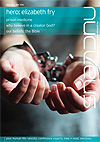We assume most Nucleus readers have little experience of prisons; indeed you probably wondered why a set of handcuffs were on the front cover! According to Ministry of Justice figures, 85,285 people were in prison in the UK as of 4 April 2014; that's slightly more than one in 1000 of the UK population. Like anyone else, inmates have healthcare needs, although they are often more complex than average. Sammy Mercer's story of shadowing a prison doctor (page 28) gives some insight into this unusual and needy world. Sammy isn't the first Christian to see the value of serving prisoners. Elizabeth Fry, a great reformer in the UK justice system of her time, is one of this edition's 'Heroes and Heretics' (page 32).
Prisons appear frequently in the Bible. Some of Paul's letters were written from prison, and Jesus uses the example of visiting prisoners in the parable of the sheep and goats (Matthew 25:36). But not all references to prison are necessarily limited to physical incarceration. Early in his ministry, when asked to read in the synagogue, Jesus quoted Isaiah 61, which says 'He has sent me ... to proclaim freedom for the captives and release from darkness for the prisoners' (see Luke 4:16-30 for the full story). It seems a safe assumption that Jesus wasn't literally promising that every single person in jail would be released. The freedom he speaks of is so much more than physical freedom.
There is a sense in which everyone in their sinful state is a prisoner. 'The god of this age has blinded the minds of unbelievers, so that they cannot see the light of the gospel that displays the glory of Christ, who is the image of God.' (2 Corinthians 4:4). Giles Cattermole's article on the Bible (page 6) describes God's revelation to us, so necessary for us to know anything of him when our own eyes are blinded.
For those unable to see God's revelation, questions about the very existence of God are quite understandable; Chris Knight's article(page 22) looks at how we might answer some of these questions, playing a part in God's work of bringing sight to the blind (also mentioned by Jesus in the synagogue in Luke 4).
Everything is quite different when we walk in the light, with our eyes no longer blinded. Our view on human life changes (page 14). We enjoy being with other believers (particularly at CMF conferences (!) – pages 4 and 10). But ultimately this is not about us. When we are set free from the prison of our sin, it is ultimately to contemplate God's glory, and be transformed into his image. We hope that this edition of Nucleus will play a small part in helping you see more of the glory of God.
'And we all, who with unveiled faces contemplate the Lord's glory, are being transformed into his image with ever-increasing glory, which comes from the Lord, who is the Spirit.' (2 Corinthians 3:18).
































